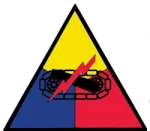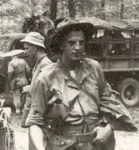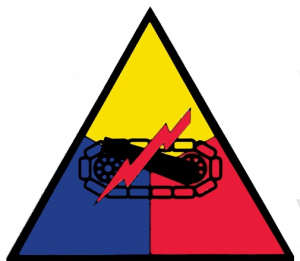Sgt. Glen Arthur Wittekindt was born in Oak Park, Illinois, on March 4, 1921, to Henry H. Wittekindt and Attie Amundsen-Wittekindt, and had a sister and brother. The family resided at 712 Chicago Avenue, Maywood, Illinois. He graduated from Lincoln School and Proviso Township High School in 1938. After high school, he attended the Illinois Institute of Technology earning a degree in mechanical engineering in 1943, and worked at the Armstrong Brothers Tool Company, Chicago. While he was a student at IIT, he registered with Selective Service on February 16, 1943, and named his father as his contact person. On October 9, 1943, he was inducted into the US Army. It is not known where he did his basic training,
According to information provided by his family in the 1940s, he was a member of C Company, 173rd Engineers (the 173rd appears to have fought in Europe). Other sources, including his own statements indicate he was an engineer, but the unit is not known. It may have been the Sixth Combat Engineers. It is known that he took part in the invasion of Leyte, Philippine Islands in October 1944 and wrote a letter home. The following letter was received by his parents in December 1944.
“Dear Mom and Dad:
“I wish I could have seen your faces when you saw the envelope of this letter….I know you have been worrying ever since the Philippines were invaded, and I am proud to tell you that I was one of the first to hit the islands. I wasn’t in the first wave, but I didn’t come in with the USO either.
“The first couple of days and nights were pretty rough, but I never did see a live Jap. Of course when I tell my grandchildren about it everything will be different, but I will tell you a little more conservative version. My knees starting shaking hen some mortar shells started splashing around when we were coming in. Then about that time I was getting my bearings on the beach, mortar shells started popping. Lucky there was a foxhole nearby and I really dove in. And I and another fellow on my gun sat in it until Navy dive bombers came in and the mortar was silent. We then picked up the gun and took off inland. We just got started and I heard armor coming down the road on my right fast. We got set up for trouble and waited. It was so early after the beach was hit that we didn’t know who was who or what was going on. Brother I was glad when they came into sight and they were ours. There were about eight light tanks and they went straight up the road away from us, and we felt a lot better when we knew they were ahead of us.
“With the nervous reaction and work under the hot sun we had a tough time digging in. We finally got dug in and then just sat and waited for possible trouble. We’ll, it never showed up, than God. Then about an hour before sundown we had to move our position. You never saw a gun emplacement dug as fast as that one was. “D” night we wanted to be dug in good, and with a lot of hard work made it. That night was the hardest night I hope I ever have to go through. We were all dead tired but we were afraid of a Jap infiltration.
“Just at nightfall they came and got my fourth gunner to work on the beach, so two of us stood guard while the other tried to sleep. We tired a wire to each other to keep jerking each other to stay awake. We did this the next night too, and then only one man stayed awake because things were pretty secure.
“The next day (“D” plus 1) we got rations and water, and spent the day digging in some more and clearing and gathering up our equipment. The next night was about the same, with shadows creeping up and then disappearing when a flare lit up the sky. Both nights the cocoanuts caught hell from the trigger happy boys. No one in my gun crew fired a shot during the operation.
“Either ‘D Plus 1’ or ‘D plus 2’ you came close to getting a regret telegram from the government. A couple of guys and I were walking along when a couple of guns went off, which we supposed was our artillery. We Laughed when some of the boys that had just landed dived for foxholes. We quit laughing when a shell hit about fifty yards away and then we dived! We huddled in our foxhole and caught the devil for a few minutes from a big Jap mortar. Then our guns opened up and a couple of navy dive bombers went over and knocked them out. Luckily there were no casualties, and that taught us a darn good lesson.
“About ‘D plus 4’ we heard a large fleet of Japs were coming in. Brother! We move our guns down to the beach and got set for a dawn when we were sure a lot of us would die like rats in a trap. Japs in back fighting our infantry, Jap held islands ringing us, and Jap fleet in front of us. I really thought of you and Maywood that night. All of our news is by word of mouth and distorted, but the way I heard it when the Jap fleet just about was ready to smash in our navy caught them. I heard our navy was greatly outnumbered, but more of our ships kept coming in and the Jap fleet got a pasting. I guess we were pretty close to getting wiped out, but the navy saved us in the nick of time. Because of the naval battle, I suppose, we didn’t have many planes, so every night the Tokio express came over, and during the day they came and strafed. Our anti-aircraft got busy and started knocking them down like clay pigeons, and we cheered every burning plane.
“Then one day we saw a sight that started everyone cheering. Four P-38’s! That meant the Army Air Corps was coming in. Now it is suicide for a Jap plane to come anywhere near us. We may curse the Air Corps as a bunch of grafters but we were sure glad to see them.
“As I wrote you, I am a little cog in a big team, and team-work won the beachhead. The navy, Naval Air Corps, artillery, infantry, engineers, ordnance, etc., all had their parts to do., and we all did them. The Germans had a good machine when they took over Europe, but our team is a lot better. There are bound to be mistakes, but we figure on them and hold enough in reserve so the we can’t be stopped.
“By the way, our company did such a great job that there was a presidential unit citation. I don’t know if we get it but it means a lot to even be considered for it. We are back to our old status now and are building roads, bridges, etc., but I will tell you about that in my next letter. I can tell you that I was on Hawaii as you guessed.
“Your boy
Glen”
He next took part in the Battle of Okinawa. It appears he landed on Aguni Island. After the war he was sent to Korea and became ill. He was returned to the United States and then sent to Hines Hospital, Hines, Illinois, just outside of Maywood. It appears that he was never discharged from the hospital and died on October 7, 1946. After funeral services at the funeral home, he was buried in Acacia Park Cemetery, Chicago, on October 10, 1946.







